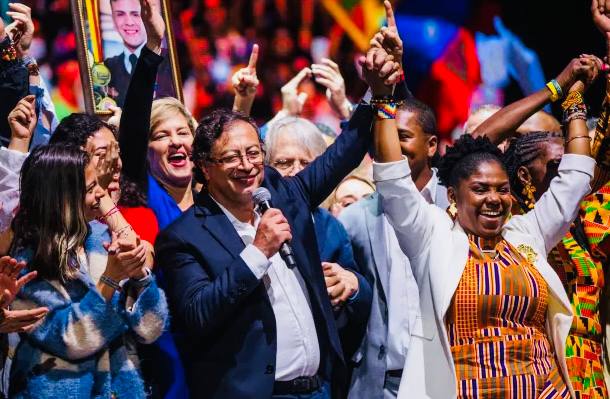The left-wing surge that continues to engulf Latin America recently claimed its latest and most unlikely victim – Colombia. Gustavo Petro’s 50.46% election won as the first leftist coalition government in the country shook the US imperialist project. How did emerge from behind the FARC guerilla war, evading right-wing death squads ? Left Berlin asked Germany-based Colombian left-wing activist Diana Sepúlveda.
1. How did Gustavo Petro reach such popularity that he was able to convince the nation that he could be president, even after being a guerrilla fighter and being in prison?
Gustavo Petro’s political work has a long trajectory far beyond his past as a militant in the M-19. I would not say his triumph is due to his popularity, but, in my opinion, is attributed to several factors:
First, it is intrinsically linked to the 2016 peace process. After the signing of the peace process, the concept of the internal enemy disappears, making state repression and persecution against the Left unjustifiable.
This is a new situation. There was a division between those who support an armed struggle and those betting on the resolution of the conflict through democratic dialogue. It provided a wider margin of action allowing for the unification of the Left and generating inclusive forces in the Historical Pact.
This was the third time that Gustavo Petro tried to be President. His previous attempts gave him experience to manage campaign strategies, creating discourse, and implementing effective political strategies.
Petro knew how to sustain a discourse with coherent content. Unlike in previous years, we heard a moderate, calm Petro, dispelling mistrust and offering possibility of building on differences. Petro had accumulated experience as part of the opposition, denouncing corruption in the Senate. As mayor of Bogota he brought levels of malnutrition in the Colombian capital to zero and was named the sixth best mayor in the world. This obviously gave him a lot of credibility.
His closeness to the people is evident. His speeches in public squares were very powerful, and brought him closer to those who elected him. They related to one of his slogans: “the government of the people.” One of Petro’s best decisions was to appoint as Vice-President Francia Márquez, a woman who changes politics, because of her humble origins, her skin color and the fact that she is a woman. These re-conceive power in Colombia – which now ceases to belong to a privileged class and passes to the common people.
What is most important to emphasize is that Petro, opened opportunities for other political forces to work together. Petro was not only representing Colombia Humana, he was also the candidate of the Historical Pact, a unity coalition of political, social and community forces, for real social and political change in Colombia.
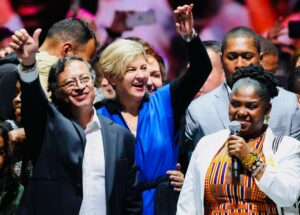
2. Was there a broad-based grassroots movement to reach the population with the message of the need for change? Can you describe this effort of militants?
This has been a process of hard work by the Opposition against corruption and in defense of human rights and an “opening of the eyes” of the people, in a Colombia that cannot stand more war, inequality and injustice.
Social indicators today place Colombia among one of the most unequal and corrupt countries on the planet. Its traditional political system is based on patronage, extremely high levels of poverty, unemployment and job insecurity. Faced with this the people opened their eyes and took to the streets to demand structural changes. In response, governments only responded with repression and violence, leaving thousands wounded and dead.
In the last 15 years there has been a five-fold increase in social mobilizations in the country. Peasant, student, teacher, indigenous and union strikes, among others, marched not locally but across the entire nation. The social emergency spurred collective protests demanding not only guarantees from the government, but also political participation. This is a new element in protests Colombia.
The Opposition bench managed to unite in spite of its differences, to confront corruption state crimes, human rights violations and the defense of natural resources as one bloc.
The majority of the bench also left its privileged place in the Congress hall and decided to go into the streets to support the people and created protection and support systems for the victims of the protests. This was a rebirth of trust from the most vulnerable population towards a sector of Colombian politics that bet for change.
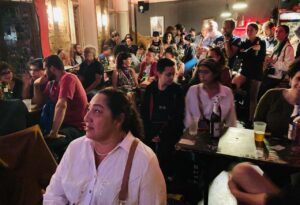
3. It was interesting how Petro’s coalition fought against the concept of the left-wing driven to violence by the FARC and the consequent US support against them. Will it change the relationship with the US, especially considering their imperialist reaction to the Petro vote? How much impact did the 3 months of mobilizations of the general strike of 2021 have?
It is true that in Colombia to be a leftist is to be stigmatized and is almost synonymous with being a guerrilla, a chavista or a communist. That is why many comrades of the left lost their jobs. The road to democracy for the left seemed impossible in Colombia. Our history of bipartisan power and decades-long neo-liberal domination, meant being a leftist candidate was a death sentence.
The Colombian left had a very reduced participation in government until now and it advanced very slowly to reach power. There are three key moments that led to the triumph of Petro: the 1991 Constitution and the arrival of new political leaderships, the 2016 peace process and the social outburst of the last three years.
The M-19 guerrilla group, to which Gustavo Petro belonged, negotiated a peace agreement in the late 1980s and generated new leaders (eg Carlos Pizarro and Antonio Navarro Wolf). The M-19 managed to become a left-wing political party, a leading political force during the process of creating the 1991 Constitution. That document defending the Social State of Law, created a progressive constitution. It includes social rights such as the right to decent housing, health, and life itself.
Now, without the demobilization of the FARC in the 2016 peace process, Petro was unable to win the presidency, since the right-wing discourse stigmatized the left as synonymous with the guerrillas. Petro’s past as a militant of the M-19, further hampered left possibilities of coming to power. Finally, again, Petro’s support of the social movement of the last three years helped his triumph.
Relations with the United States will now have to change character. The fight against drugs will continue to be an issue, as will free trade agreements and the energy transition.
In my opinion, the issue of arms imports will be complicated, since Petro is betting on a peaceful Colombia and good relations with Venezuela and Cuba. He wishes to bring Latin America to dialogue and unity, as he expressed in his inauguration speech. The challenge will be to focus relations with the United States on the issues of both countries and the region.
4. Being the first leftist government to come to power, there are high expectations about this new president. How much can be achieved considering Colombia’s tumultuous past and the nation’s conservative framework?
Expectations are very high and I think we have to be realistic and be very clear that in four years we will not be able to change the history of Colombia. But I believe that this government will bet on total peace, on implementing the agreements of the peace process carried out with the ex-guerrilla FARC group and will seek dialogue with existing armed militias. It will be a government that will not attack protesting population and will respect human rights. It will be a government seeking to reform health, education and production systems. I believe that these will be the pillars of Petro’s government and time will tell.
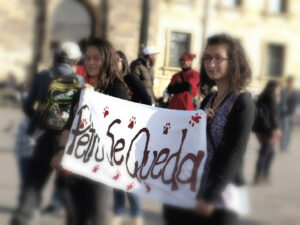
5. Will there be a more forceful fight against right-wing terrorism, such as the Black Eagles and other groups?
Testimonies given before the JEP (Special Jurisdiction for Peace), as well as the investigations and denunciations by congressmen (eg. Iván Cepeda and Petro) revealed the reach of paramilitary groups in Colombia; and how flawed institutions and governmental structures are. To the point that we talk about ‘para-politics’. It will not be easy to combat this scourge in just four years.
Criminal groups infiltrated all areas of the lives of Colombians. I personally do not believe that the so-called Black Eagles are a criminal group: there is a link between state agents and criminal groups that commit crimes under the name of the Black Eagles. The reach they have throughout the national territory can only occur with the complicity of state forces.
The goal has to be to put an end to state corruption but also to carry out reforms of the armed forces, to ensure that the police becomes a civilian force at the service of the population not under the command of the Ministry of Defense. Moreover, the ideology of ‘annihilating the enemy’, under which the public force was created must change to providing educational and training opportunities for police and military, based on principles of respect and defense of human rights.
I can imagine that the new Petro and Francia Márquez government, if given the opportunity, could bring in a peace process with paramilitaries and criminal groups, since their desire is for total peace.
6. Petro promised reforms to fight corruption and inequality. What success do you expect he will have in these areas; what other reforms do you think are key to keeping the faith that his voters place in him?
There are tangible reforms that can be achieved in the short and medium term. Petro announced the declaration of an economic emergency to prioritize the country’s hunger issues, this is achievable. Others are, pension reform – such as not increasing the pensionable age, currently 57 years old for women and 62 years old for men. He will also look to set up tariffs to protect national agriculture and industry, to lower inflation levels, especially in foodstuffs.
Petro will surely look to implementing the 2016 Peace Accord, giving priority to comprehensive rural reform, as recommended by the United Nations High Commissioner for Human Rights. These, among others, will surely be priorities in Petro’s government.
The coalition with Historical Pact (Pacto Historico in Spanish) will play a leading role, especially in the fight against corruption, especially in the Congress of the Republic.
7. Considering the alliances agreed to win the elections, both by the Historical Pact and with regional leaders of dubious character, how many changes can President Petro make in these four years?
Colombia is a diverse country, with a complex history of violence leaving victims on both all sides full of bitterness and anger. Petro received a country in disastrous conditions, both socially and politically. But a president has to be intelligent and strategic to be able to govern for everyone, and this is Petro’s proposal.
Petro does not only speak to those who follow him. He also speaks to the right-wing government, to the religious groups, to the elites and businessmen, and to the political parties in opposition. The objective is to carry out a great national dialogue, as this has not happened with previous governments.
His government’s success will depend on these rapprochements and on achieving agreements about the fundamentals. One of the great fears of many Colombians in the presidential campaign was the issue of expropriation and both Petro and Márquez ended this rumor and managed to initiate a rapprochement with some business associations. The Historical Pact might have finally entered the Congress with the right conditions but the road will be a long one.
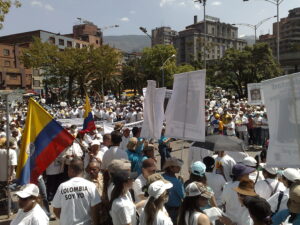
8. Will Colombia be able to change from an oligarchic economy to a more egalitarian system, considering that Petro has said that he would not make expropriations as were enforced in Venezuela and Bolivia?
The objective of this government is not to completely change the system. But it is to make reforms to guarantee and defend the rights of the population. For this purpose, expropriations are un-necessary. Petro has studied different economic models and devised a vision to allow him to prioritize satisfying the basic needs of the population, while promoting sustainable, environmentally and community friendly productive initiatives. This has nothing to do with expropriation, but rather with progressive economic models. These project a future, by creating conditions to guarantee economic stability while reducing poverty levels and promoting intellectual development. The investment is in the people, in their health, in their education, in their lives, just as many industrialized countries do.
We will continue to have rich people, but they will pay more taxes, as in many other countries.
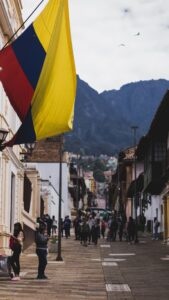
9. As Petro has looked with admiration at what Chavez did in Venezuela, how will relations with his neighbor change in the next few years?
I think Petro will have to open the border with Venezuela that Iván Duque closed upon recognizing Guaidó as interim president of Venezuela.
Bilateral relations will have to be re-established because of nearly 1.8 million migrants who fled to Colombia, and the hardship for Colombians who live in Venezuela from to the border closure. The closing of the border created tension between armed groups and the armies of both countries. As Petro himself tweeted: it is necessary to open the border and to ensure the exercise of human rights as the first step. Subsequently, there will be regional dialogues in which the Venezuelan President Maduro will have to take a position, since one of the objectives is to transition from combustible energies to clean energies. Venezuela, as a major oil producer, will have to decide whether to join this initiative or not.
In addition, attention to the refugee population will be another issue on the table.
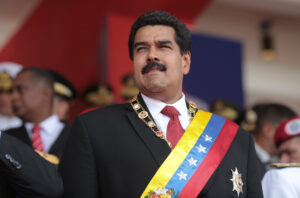
10. Finally, what are Petro’s weaknesses and main threats, considering that thousands of left-wing activists and even politicians have been assassinated in the last decade?
There have been failed attempts to assassinate Petro, but this time we have a Petro who is not alone.
Let’s not forget that this government program was agreed by a coalition, it is useless to kill Petro, because we have new strong leaders to implement this program, such as the vice-president Márquez. At this moment in the history of the country, an assassination is not in the interests of any of the sectors of the country. I believe that the attacks already have a different character. We have found out about them through media outlets (Semana magazine and RCN), in charge of carrying out dirty smear campaigns to discredit the new government. I believe that they have its eyes set on Petro and will not miss the opportunity to attack and discredit him and his government as much as possible.
On the other hand, I imagine that reaching agreements with some unions and right-wing politicians on issues such as the extraction of natural resources or health reform, will be very difficult and that bloc will not yield in the negotiations.
But these are only speculations, because at this moment we are betting on the government of Petro and Francia with the Historical Pact; a government representing the majorities which talks to all sectors of Colombian society, a government pushing for real change in everyone’s lives.
Diana Sepúlveda is a Berlin-based social and political activist, a social communicator and a Professor of Human Rights. She is a member of Vamos por los Derechos International (Working for Rights International), militant of the Polo Democrático Alternativo political party and active member of the International Historical Pact that has backed the president in this coalition.
